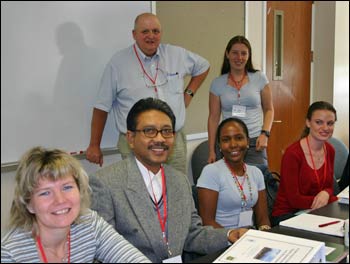Some of the key people in charge of the world’s natural resources are at Northern Arizona University examining ways to manage and protect them.
Twenty natural resource managers from 17 different countries are attending the International Seminar on Forest Administration and Management from Oct. 2-21, an intensive transfer of ideas and discussions about natural resource management and conservation.
“We’re hoping to get some common ground established and to open up a dialog between these people from around the world who are facing similar issues in forestry,” said Michael Wagner, a Regents’ Professor in NAU’s School of Forestry and seminar coordinator. “We hope to open up the doors for a lot of collaborative work to happen.”
Offered by NAU’s School of Forestry and the U.S. Forest Service Office of International Programs, the seminar is designed to enhance the skills of senior natural resource professionals by providing an interactive collaborative approach to environmental issues and land management. NAU will host the seminar for five years.
The group will explore restoration ecology, biological diversity, sustainable forest management, forest health, indigenous and community management systems, fire management, legal policies and how to marry tourism with ecology.
Participants will attend numerous classroom lectures and discussions as well as field trips highlighting the unique geography and culture of the region. They will learn about the different life zones that exist from Sedona to the Grand Canyon, and will visit Native American elders on the Hopi mesas.
The last week of the seminar will be spent traveling to visit the forestry department at the University of North Carolina and to meet with environmental policy makers in Washington, D.C.
“Hosting this seminar reflects the stature of our School of Forestry in the international arena,” Wagner said. “It also creates opportunities for our faculty and students to become more internationalized, and it helps us all remember that the world is a small place.”
He said NAU was chosen to host the seminar because of its quality forestry program and its location in the largest ponderosa pine forest in the world. Wagner hopes by helping other countries better manage their natural resources, NAU will help to improve the image other countries have of the United States.
“I know we are not going to solve the world’s problems,” Wagner said, “but we’re providing an opportunity for people to work together.”
Sky Stephens, a doctoral student in the School of Forestry who is helping organize the seminar, said, “We have lots of fun planned, too. They will learn about cowboys from a cowboy on a working ranch and will even get a chance to take country dancing lessons.”
To ensure the worldwide dialog continues once the seminar concludes, Stephens is organizing a post-seminar distribution e-mail list that will be added to each year. “We want the participants to continue this collaborative experience long after their trip ends.”
Marina Muran, an agricultural assistant from Russia, concurred, “Russia and America already have a close relationship working with our forests, and I am here to learn ways we can continue to address forest health through policy change.”
Wandreia Dos Santos Baitz, a researcher from the Amazon Institute of People and the Environment in Brazil, said “I welcome this opportunity to share information about the environment and to learn about tools for managing forests.”



